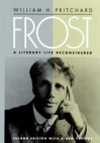
William H. Pritchard
Autor von Frost: A Literary Life Reconsidered
Über den Autor
William H. Pritchard is Henry Clay Folger Professor of English at Amherst College
Werke von William H. Pritchard
Zugehörige Werke
Selected Poems Including the Woman at the Washington Zoo (1956) — Herausgeber, einige Ausgaben — 123 Exemplare
Literary Genius: 25 Classic Writers Who Define English & American Literature (2007) — Mitwirkender — 90 Exemplare
Getagged
Wissenswertes
- Geschlecht
- male
Mitglieder
Rezensionen
Dir gefällt vielleicht auch
Nahestehende Autoren
Statistikseite
- Werke
- 15
- Auch von
- 2
- Mitglieder
- 300
- Beliebtheit
- #78,268
- Bewertung
- 4.0
- Rezensionen
- 4
- ISBNs
- 27














Pritchard’s is a worthy sequel to Theodore Baird’s English at Amherst which describes how the subject of “English” emerged from the philosophy and theology degrees that populated the faculty at the turn of the 20th Century. Both books take their place in the rich pantheon of histories of the college, from W.S. Tyler to Meiklejohn, from Thomas LeDuc and George Whicher to George Peterson. Now that the College has rejected its excellent fight song, “Lord Jeffrey Amherst,” the fine shelf of college histories bejewel its fame.
“English” was not required to enter Harvard until the late 19th Century, when the Latin entrance exam added contemporary English literature, Silas Marner, which became a mainstay of H.S. English in America until my days in the early sixties. But Amherst’s English 1-2 was a unique, rigorous course with daily papers, designed by Theodore Baird and Armour Craig. The latter was Department Chair my freshman year, and taught my section of English 1. He got me an Amherst Fellowship when I left for grad school at the U of Minnesota, where I adopted daily papers, evoked by questions such as “Have you ever lied? Tell of a time where you masked the truth with language.” Another quarter I asked them about knowing and not knowing, “What would you call such a story, whose truth you are not sure of? A lie? Fiction? Gossip? Hearsay? Myth? Superstition?”
Perhaps my most popular course, third quarter, asked them to assess Beatles songs as a dramatic monolog, like “Hey Jude,” or songs with irony, such as those by U of Minnesota dropout, Bob Dylan/ Zimmerman, “How Many Roads?”
Two roads. That’s how many the subject of Pritchard’s Ph.D. walked down, diverged in a yellow wood (evidently in Olde England, though it always reads like the Newer one). Securing the Instructorship at his undergrad mater, his lowly position had the perk of serving as secretary to his doctoral Subject on his yearly two visits to Amherst as Simpson lecturer.
“Frost’s mind…in connection to poetry was full of touchstones, not exactly Arnoldian ones, just couplets or whole poems that meant everything to him. Or it felt to me like ‘everything’ the way he would say aloud lines like
William Collins’ “Ode” of 1746:
‘How sleep the brave, who sink to rest
By all their country’s wishes blest!
Or James Shirley's dirge from one of his plays:
‘The glories of our blood and state
Are shadows, not substantial things…
Sometimes it was no more than a brief moment, a saying excerpted from a poem that seemed to mean something to him that I could not possibly understand, as in three lines from William Vaughn Moody’s “Gloucester Moors,” a poem I’d never even read:
‘Who has given to me this sweet?
And given my brother dust to eat?
And when will his wage come in?’
It was Frost’s speaking voice, fetching up these bits of remembered lyric he had carried around with him since sometime in the preceding century, that unfailingly heroicized them, made a listener feel in the presence of something lofty, noble, heart-stirring.
" That was the accent I was listening for, although there were other, less lofty ones to be heard…about the absurdity of the United Nations…You had to hear how canny Frost had been in dealing with the government so as to procure Ezra Pound’s release from St. Elizabeth’s Hospital (it turned out that Archibald MacLeish was the significant mover in this case)…and how the later Yeats’s highly sexualized poetry revealed him as a dirty old man. One sat through these oft-reformed routines and waited for something less prepackaged.
"One of Frost’s letters speaks of the difference between “thinking” and “voting,” and how much classroom talk by teachers and students was taking sides…
When I suggested to him that I hoped to publish my dissertation as a book he was unimpressed, advising me to “keep it around” to “deepen” it. (I ended up keeping it around for twenty-four years.)"[128-29]
I quote Pritchard at length to do justice to our his prose, but still omit much subtlety and complexity. As an aside—in a series of asides—I am gratified to note my poetry teacher Archibald MacLeish’s role here, perhaps the only time he surpassed the good grey poet.
MacLeish was most generous to me, securing with my grad advisor a yearlong research grant at Brown University, and praising my resultant essay, “Your effort is better than academic. It leaves me feeling learned and grateful.” I used this on the back-cover of my book including that essay, to the annoyance and elimination of academic reviewers. But MacLeish left Amherst soon after he came there as Simpson lecturer, and taught me and my brilliant friend Tom Weiskel, who ascended to Yale (a protege of H Bloom) and beyond.
Tom was a brilliant parodist of fiction and criticism, whom I attempt to capture in Parodies Lost (2016). He was also, to round out this note, the undergrad advisee of Bill Pritchard.… (mehr)